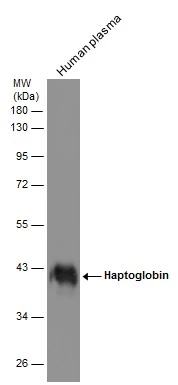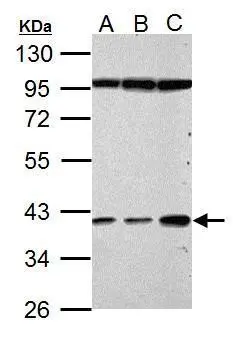Overview
- SupplierGeneTex
- Product NameHaptoglobin antibody
- Delivery Days Customer9
- CertificationResearch Use Only
- Concentration0.69 mg/ml
- IsotypeIgG
- Scientific DescriptionThis gene encodes a preproprotein, which is processed to yield both alpha and beta chains, which subsequently combine as a tetramer to produce haptoglobin. Haptoglobin functions to bind free plasma hemoglobin, which allows degradative enzymes to gain access to the hemoglobin, while at the same time preventing loss of iron through the kidneys and protecting the kidneys from damage by hemoglobin. Mutations in this gene and/or its regulatory regions cause ahaptoglobinemia or hypohaptoglobinemia. This gene has also been linked to diabetic nephropathy, the incidence of coronary artery disease in type 1 diabetes, Crohns disease, inflammatory disease behavior, primary sclerosing cholangitis, susceptibility to idiopathic Parkinsons disease, and a reduced incidence of Plasmodium falciparum malaria. A similar duplicated gene is located next to this gene on chromosome 16. Multiple transcript variants encoding different isoforms have been found for this gene. [provided by RefSeq]
- Storage Instruction2°C to 8°C,-20°C
- UNSPSC12352203
References
- Effect of high glucose on secreted proteome in cultured retinal pigmented epithelium cells: its possible relevance to clinical diabetic retinopathy. Chen YH et al., 2012 Dec 21, J ProteomicsRead more
- Hemopexin is up-regulated in plasma from type 1 diabetes mellitus patients: Role of glucose-induced ROS. Chen CC et al., 2012 Jun 27, J ProteomicsRead more
- Proteomic analysis of retinopathy-related plasma biomarkers in diabetic patients. Lu CH et al., 2013 Jan 15, Arch Biochem BiophysRead more
- Redox-proteomic analysis of doxorubicin-induced altered thiol activity in cardiomyocytes. Lin ST et al., 2013 Mar, Mol BiosystRead more



